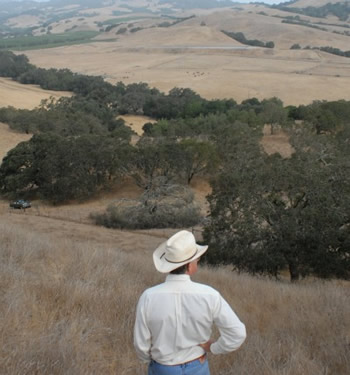Next morning, I circumnavigate San Francisco, and make it to Nell’s house in Sacramento in under three hours. It’s in a tree shaded suburban ranch, one story and red brick, that sits driveway to lawn next to the houses on either side. Odd place for a pot farm, I reckon. Maybe she grows indoors or else she’s got a pretty large, oblong shaped backyard.
Nell opens the front door before I ring the bell.
“Knew it was you!” she exclaims. “Car’s a hoot!”
Nell’s in her very early sixties, two or three years older than me, blonde haired with these great big blue flickering eyes. She’s wearing a floral patterned silk blouse, black pants, and ballet slippers, and her round smiling face radiates mischief and curiosity in equal measure.
“How about some show and tell?” I ask as we plop down at the kitchen table.
“Wonderful, I’ll open a bottle of white wine.”
I show Nell a joint of Sour Diesel sativa, and tell her all: how I met her friend Ann after breaking my wrist in Birmingham, why I decided to take a road trip in a Smart Car, my misadventures in Houston, Austin, Tulsa, and Taos, my romantic problems with Muse, my exploration of the medical marijuana culture in L.A.
“Wow,” Nell says. “You’ve been busy.”
Halfway through the bottle of wine, Nell’s husband Barry comes home from work. He’s tall and lanky with a trim mustache, does architectural contracting for the state of California. He and Nell went to the same high school back in their hometown of Bakersfield. But they didn’t get sweet on each other until after college a Berkeley, where they both earned undergrad and masters degrees in design. I tease that they must be oilfield trash like me.
“As a matter of fact, my father was a geophysicist and Nell’s father was a geologist for the same company,” Barry says.
After dinner, we compare my Sour Diesel joint to a joint of Nell’s pot; both get rave reviews. Turns out the farm isn’t in her backyard. It’s a co-op outside the town of Paradise, two hours drive north, where her older brother Don is a hands-on grower. After judging the pots to be of equally high quality, Nell excuses herself from the table to call Don on a land line in the master bedroom. I step outside to call Muse on my cell.
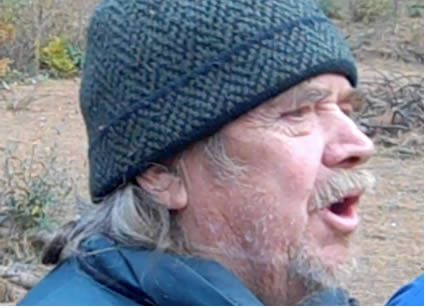
“Get tomorrow plane ticket San Frisco, ” Muse says in a stuffy voice.
“Sounds like you’ve got a cold.”
“Nose running. You are picking up chicks before I come?”
“Nein!”
“Your buddy Tiger Woods is getting his horny ass busted big time.”
I cringe. For the past week, it’s been all over every media under the sun and in cyberspace that the golf legend crashed his SUV into a tree beside his driveway in the wee hours of the morning after Thanksgiving. Each day brings new revelations about his alleged extra-marital escapades with waitresses and porn stars. If I’m a celibate monk by comparison, I reckon any comparison is odious at this stage.
“Tiger and I aren’t buddies,” I say. “We met once. On the driving range at his home course outside Orlando. His wife, Elin, was with him”
“She is Swedish,” Muse notes. “She needs to divorce him, and find a nice sweet lover who is a gentleman.”
“Don’t know about her or him. We just shook hands and said hi.”
I steer the conversation to my purpose in visiting Sacramento.
“Get the pot farm job, I can wind up my road trip.”
“Ja? Thank God. I hate this road trip.”
“Really? Could’ve fooled me.”
“This will be dangerous, the pot farming?”
“No way, dude. We’re talking medical marijuana. It’s all about alleviating pain.”
“Pot for me causes nothing but pain. Bitte, you will be careful?”
“Why do you care?”
“You tell me before you jump out of the plane that I get your hat collection.”
“Ja. So?”
“Already I have too many hats.”
“I’ll keep that in mind.”
I click off and return to the kitchen. Nell tells me I’m all set to rendezvous with Don the following morning. There’s just one thing I need to know.
“My brother had a stroke two years ago,” she says. “Sometimes he’s a little slow.”
###
Paradise perches on a pine studded volcanic lava cap above the Feather River and Butte Creek canyons at the western edge of the Sierras. Local legend says the name comes from a previous incarnation as a gold miner’s gambling outpost called Pair O’ Dice. With a population of 26,408, it’s a tad smaller than Taos, New Mexico, but it shares the same hippies and bikers vibe minus the art galleries and the ski resort.
I meet Don at his two-bedroom redwood cottage just off Highway 191. Although there’s just a slight chill in the early December air, he’s dressed for mid-winter in jeans, a down jacket, and a wool cap pulled down over his shoulder length gray hair. He’s got the same great big blue eyes as his sister, but instead of flickering, they kind of flutter under droopy lids weighted with sadness and surrender.
“Nell told me you were trying to drive that little car of yours across the country,” he says. “Looks like you’ve just about made it.”
A cleaning lady is vacuuming in the living room, so Don and I sit down at a picnic table on the back porch with the cleaning lady’s twenty year old daughter and infant granddaughter. He fires up a pipe full of pot, and takes a toke. I take a toke, and pass it back. Don offers the cleaning lady a toke. She takes one, and passes the pipe to her daughter, who takes one and passes the pipe back to Don.
Such is the full circle of Paradise.
Nell’s caveat notwithstanding, Don proves to be quite lucid and articulate in discussing his chosen field of cannabis cultivation. According to various estimates by journalists, law enforcement officials, and fellow growers, he says, the street value of California’s 2008 pot crop was $14 billion. Although total sales from traditional agriculture were $100 billion, pot commands the highest price per volume of any crop, roughly three times that of premium wine grapes.
With the State of California in bankruptcy, there’s yet another upcoming ballot initiative to legalize marijuana pot for the purpose of reaping direly need tax revenues. “Even though growing pot is my main source of income, I like the idea of putting a surtax on it like the one on alcohol,” Don confides. “Take away taxes, and your civilization implodes.”
Like other proponents of legalization, Don contends it’s the best way to reduce the criminal element that is currently expanding operations in national parks and national forests in Humbodlt, Mendocino, and Trinity counties, the so-called “Emerald Triangle” west of Paradise. “The illegal 1,000 acre pot farms up there are run by Mexican drug cartels,” he says. “Their people carry guns.”
Don claims his medical marijuana operation is about as government sanctioned as can be given the disconnect between state and federal pot laws. The co-op comprises eight patients with physician referrals, and grows a total of 48 plants. “Last May, the sheriffs came by to count our plants and our referrals,” he says. “They found everything was in order, and left. It was a stamp that we’re within our rights.”
The sheriffs’ visit may literally have saved the farm from going up in flames. In June, a major fire swept through 22,800 acres of land between Paradise and the town of Chico fifteen miles to the west. According to Don, the fire fighters defended plots like his where the sheriffs had counted plants, but let the illegal operations burn.
“For me, growing pot is not about the money, it’s about the medicine,” he insists. “Since I had my stroke what used to be simple is difficult, and what used to be difficult is impossible. Sometimes just making coffee confuses me. Pot takes away the frustration and anxiety of not being able to do things. I smoke a joint and mellow out.”
That said, Don offers to show me his farm, but first he wants to smoke some more pot. I go out to the Smart Car, and unload a couple of bags and the turtles pan to clear the passenger seat for him. When I come back into the living room, Don’s lights a joint, takes a toke, and passes it to me.
“Turtles pretty cool,” he says, coughing. “Put ‘em on kitchen counter so cleaning lady won’t bother ‘em.”
###
Our drive to the pot farm takes close to an hour, most of it uphill. Although I track the mileage on the Smart Car’s trip odometer, I don’t jot down Don’s directions. Paranoia dies hard: I want to be able to swear I don’t know the farm’s location even though it’s passed the sheriffs’ accounting.
We turn off a main highway onto an asphalt back road somewhere in the middle of nowhere. Don asks me to stop at an A-frame general store so he can buy cigarettes. Then we continue down the asphalt road until the pavement turns into dirt.
After bounding through a series of deep ruts and S-curves, we come to the dirt driveway of an 80 acre spread. It’s dotted with Douglas fir, sugar pine, oak, cedar, and dogwood trees, many of them burned black from the previous summer’s fire.
“Welcome to Buckhorn Valley Ranch,” Don says.
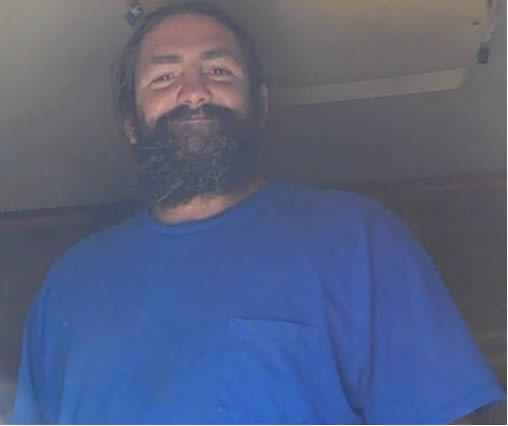
There’s a cattle catcher at the top of the driveway and an aluminum gate that’s not connected to any fence. Don tells me to park, we’ll walk the rest of the way. My odometer shows 25.2 miles since we left his cottage back in Paradise.
Barking black Labradors announce our arrival in the valley below. I see a two-bedroom mobile home, a seven foot tall canvas tent, a black pickup truck, and a vegetable garden. A tie-dyed hippie freak flag flies high on a pole in front of the tent.
A heavy set white dude with a black ponytail and a long black beard hobbles out of the mobile home on a crutch. His name’s Jerry, and he’s the landowner and the resident manager of the pot farming co-op. A plump woman with honey colored dreadlocks who turns out to be Jerry’s wife, Liz, collars and quiets the Labs. As Don introduces us, I notice both Jerry and Liz have no front teeth.
“We grow the best pot in the world,” Jerry declares.
“Well, I’m a qualified patient,” I say, whipping out Dr. Schlater’s referral.
“Good,” Jerry says, examining the parchment. “Let’s go try some.”
Don and I follow Jerry into the trailer, and sit down on a rumpled bed behind the driver’s seat. Jerry starts the engine of the mobile home to turn on the electrical power. He slips a Bob Marley album into the CD player, and fires up a joint.
“This is our Old Granddad Afghani Big Bud,” he says, toking on the joint and then passing it to me. “They key to maintaining potency and consistency is the seeds. Some growers clone plants from one season to the next. We don’t do that. We start fresh every season by planting newly sprouted seeds.”
My first toke of Jerry’s pot feels more intoxicating than two shots of Old Grand-Dad bourbon. The second toke is the equivalent of drinking half a bottle.
Presently, the three of us stagger down a yellow dirt path to a lower valley where the pot garden’s located. I count 48 brown stalks sticking up from separate chicken wire baskets lined with straw. The baskets are linked by a web of gravity fed drip lines. The garden is surrounded by a chicken wire fence. A plywood board next to the fence bears a plastic envelope containing patents’ referrals and a notice that reads:
“THIS CANNABIS GARDEN IS BEING GROWN FOR MEDICAL PURPOSES PURSUANT TO HEALTH & SAFETY CODE 11362.5, 11357, AND 11358 IN ACCORDANCE WITH THE LAWS OF THE STATE OF CALIFORNIA.”
Jerry informs me that the chicken wire baskets are his most important innovation as a grower. “We don’t have to break our backs every year digging shovels into the ground,” he says. “We just fill the baskets with nitrogen rich top soil. Because the baskets drain, there’s no mold, and because they’re sitting up off the ground, the gophers can’t get to the plants.”
Jerry fires up a joint as we inspect the garden. Then we go back up to the mobile home, where he fires up yet another joint. I know the pot harvest ended the last week of October, but I ask if there might still be some work I can do around the farm.
“Come back tomorrow,” Jerry says between tokes. “I need somebody to help me pull skeletons.”
###
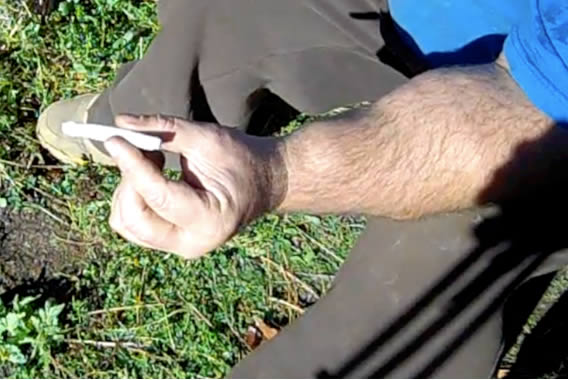
That evening, I treat Don to dinner at a Mexican restaurant in Paradise, and he gets to talking about his life before the pot farm and before his stroke in initially irreverent terms that gradually turn spiritual. After high school in Bakersfield, he says, he enrolled at San Francisco State just in time to participate in the longest anti-Vietnam war student strike in history. After being arrested for unlawful assembly, he dropped out of college, which made him eligible for the Vietnam war draft. He applied for a 4F medical deferment using a very risky strategy.
“I took LSD every single day for three years,” he recalls. “I got to the point where I would go around asking, ‘What time is it? What day is it? What year?’ Finally, the draft board said the words I was longing to hear, which were, ‘We don’t want your kind.’”
Back at his cottage, Don informs me that he went on to become a custom jewelry maker. He also created ceramic miniatures of mythological creatures. He shows me what remains of his inventory -- half a dozen golden dragons, several centaurs, and the Greek god Pan arranged in neat rows atop the bureau in his bedroom.
“I can’t make things like that anymore because of my stroke,” he says. “But it could’ve been a lot worse. I could be in a wheelchair, unable to talk with a quality of life not worth living.”
Don picks up a centaur, turning it over in his hand, and adding, “I want to live the rest of my life with dignity and die with dignity. But I’ve found that dignity is a sliding scale, especially when the grace is gone.”
As I change the turtles’ water and prepare to bed down on the living room couch, I realize I haven’t checked my cell phone all day. I find one voice mail and three text messages from Muse demanding that I call her immediately to discuss her travel plans. I see a fourth test message with a threat involving her former boyfriend, the German filmmaker.
“If you don’t call me right away, I agree to see Humbertus in NYC,” the message says.
I punch Muse’s number on my iPhone. Voice calling service is unavailable. I tap out a text message. It won’t send. I pull a blanket over my head, figuring I might be better off dead and hoping I’ll go out with as much dignity as Don.
###
We return to Buckhorn Valley Ranch early the next morning under a sky that’s the same bright turquoise as the wrap on my Smart Car, bearing a pizza for Jerry and Liz. The four of us smoke a joint in the mobile home before divvying up the pie. We smoke another joint after we eat our slices. Then we go down to the pot garden, where I pull skeletons for Jerry and Don films with my Flip camera.
It’s medium hard work, and quite satisfying. Skeletons are the brown stalks that remain from the previous season’s marijuana pants. They range in height from two feet to well over five feet. I yank them out, brush the top soil on the roots into the chicken wire baskets, and stack them on the bed of a utility cart.
“Break time!” Jerry hollers when I’ve pulled a little over half of the 48 stalks.
I join him and Don on a bench, where we smoke a joint. After pulling the remaining skeletons, I follow them back to the mobile home where we smoke yet another joint. Jerry compensates me for my labors with a bag of (what else?) pot. I compliment him on the superior quality of his cannabis.
“It’s all about Ja,” Jerry says.
“Ja? As in German for yes?”
“No, man. Ja as in the reggae word for God. Same as in all religions. Yahweh. Jesus, Buddha. Allah. Ja.”
A feeling comes over me that’s higher and mightier than being stoned. It’s taken me over five months and 13,000 road tripping miles, but at long last I’ve discovered what Ja means. Jerry adds a benediction to my new found bliss.
“You’re welcome to come back in the spring and help with the planting,” he says.
###
I drive the 25.2 miles to Don’s cottage in a stoned daze. When I enter the kitchen to retrieve the turtle pan, it suddenly occurs to me that Don might be the most kind hearted and most dignified caregiver I could ever find for them. The task isn’t too complicated. He just has to change the water every day and sprinkle in a few food pellets every other day. Maybe the turtles can help take his mind off the frustrations caused by his stroke.
“Sure, I’d love to keep ‘em,” Don says. “We can see who’s first to come out of their shell every morning.”
I thank him for his gracious hospitality, and jump in the Smart Car.
My cell phone service returns about half an hour south of Paradise. I call Muse. As expected, she’s pissed. I try and eventually succeed in calming her down by resorting to the facts, advising her that the places I’ve been visiting are so remote they are out of telecommunications contact with the rest of planet earth.
Then I add a kicker that surprises us both. I report that after more than five months and 13,000 miles of driving, I’ve finally been offered a job. It’s seasonal work and pays roughly $20 an hour, most of it in the form of product trade- out. But somehow I just can’t see myself as an employee of the medical marijuana co-op at Buckhorn Valley Ranch.
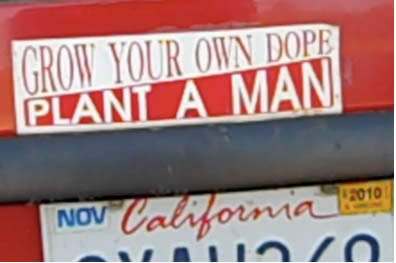
“Never thought I’d say this, but I’m potted out.”
“Ich bin sehr stolz auf dich,” Muse says.
“Hell’s that mean in English?”
“You forget your Amish friend, Herr Stolzfus.”
“Huh?”
“Mr. Proud Foot. Stolz means proud. I am very proud of you.”
“Danke, but I am still very unemployed.”
“This is better than you Smarticize with some gym teacher cretin.”
I let that one pass.
“You wear some flowers in your hair when you come to San Francisco?”
“Oh, ja,” Muse replies. “Just like in the song. I wear surprises, too.”
“Like what?”
“You see. I hang up now.”
Suddenly, there’s an eerie silence in the cockpit of the Smart Car. I don’t feel like playing a CD, and there aren’t any turtles sloshing and clanging in a pan. The only sounds are the wind sucking in through the moldings and the asphalt exhaling beneath the tires. The rest of the way back to Nell’s I ponder a bumper sticker I saw on a car parked in front of the A-frame general store where Don and I stopped for cigarettes en route to the pot farm. It read:
“Grow Your Own Dope, Plant a Man.”
Photograph Captions and Credits: 1. Pot farmer Don (HH3) 2. Pot farmer Jerry (HH3) 3. Pot farmer Jerry takes a work break with a joint (HH3) 4. Bumper sticker near Paradise, CA (HH3)
